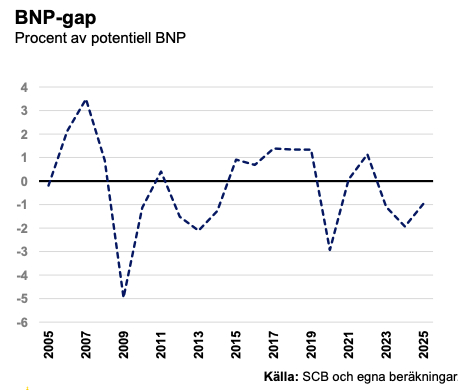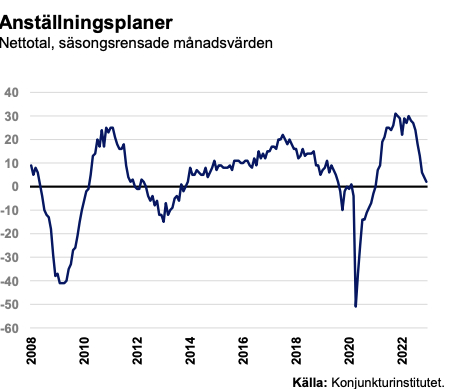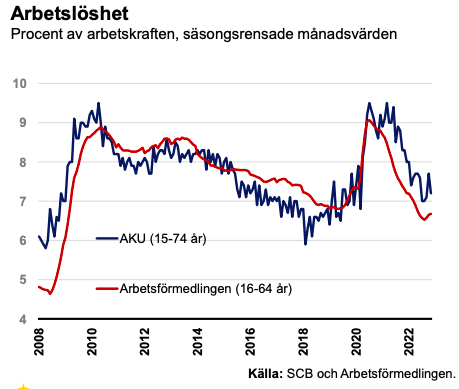Sweden's government warns of three-year economic slump

Sweden's finance minister warned on Thursday that the government now expects the current economic slump to last as long as three years before growth starts to pick up again.
"It's clear that that a significantly worse period in the business cycle is now waiting at our door and that it's going to be tough for many households," Elisabeth Svantesson said in a press statement. "The economic slump is expected to be longer lasting than we predicted in our budget proposal and looks like it won't start to bottom out until 2024."
In the government's new prognosis, it expects GDP to fall by 0.7 percent in 2023 (down from -0.4 in its former prognosis) and to grow just one percent in 2024 (down from 2 percent) and 2.7 percent in 2025 (down from 3.2 percent).
At the same time, it expects inflation to stay at a stubbornly high 8.9 percent next year, only falling back close to the Riksbank's 2 percent target in 2024 and 2025 (when it will hit 2.6 percent and 2.4 percent respectively.
"It's moving pretty fast just now, and unfortunately not always for the better," Svantesson said in a press conference about the economic outlook. "Swedish households are extremely pessimistic, much more than in other countries".
Below is a chart she presented, showing how much lower GDP was expected to be than Sweden's economic potential.

Svantesson said that current high energy prices, high inflation, and real wage cuts were putting pressure on household finances.
"A lot of households are struggling right now," she said.
She said that while there was not yet a signifiant rise in bankruptcies or layoffs, the government "sees that they are growing".
Below is a graph Svantesson presented showing how companies' hiring plans had stalled in 2022.

And here is a graph Svantesson presented showing how the unemployment rate had started to creep up in 2022 after a steady decline since 2020.

She said that the government was prioritising getting out its compensation package for those hit by high power prices, and was also open to extending the compensation package to households living in the north of Sweden, who were excluded when the package was announced last month.
The government, she said, had still not decided whether to push ahead with its campaign promise of pausing the requirement that mortgage holders pay off part of their loans, rather than just the interest.
The measure has been opposed by all three of Sweden's main financial agencies, the Riksbank, the Financial Supervision Authority, and the National Institute of Economic Research, who all say that cancelling the requirement is inflationary and would risk worsening the debt problems of Swedish households.
Svantesson's press conference came a day after the National Institute of Economic Research, the state body tasked with monitoring the business cycle in Sweden, also predicted that the slump would last three years, warning that it could take as many as five years before real salaries, adjusted for inflation, return to last year's levels.
"It will probably take a couple of years before real salaries get back to 2021 levels, even four to five years," Ylva Hedén Westerdahl, the institute's forecasting chief, said at a press conference.
"And we are never going to get back the forecast for wage increases we had before this period of high inflation. To a certain extent, these are lost years."
Her colleague Erik Spector said that the institute had lowered its predictions for GDP next year, because the government had provided significantly lower support to households than it had said it would during the election campaign.
"We were expecting significantly greater levels of support from the state, from these so-called bottle-neck charges, to households. That's something which is significantly different."
Comments
See Also
"It's clear that that a significantly worse period in the business cycle is now waiting at our door and that it's going to be tough for many households," Elisabeth Svantesson said in a press statement. "The economic slump is expected to be longer lasting than we predicted in our budget proposal and looks like it won't start to bottom out until 2024."
In the government's new prognosis, it expects GDP to fall by 0.7 percent in 2023 (down from -0.4 in its former prognosis) and to grow just one percent in 2024 (down from 2 percent) and 2.7 percent in 2025 (down from 3.2 percent).
At the same time, it expects inflation to stay at a stubbornly high 8.9 percent next year, only falling back close to the Riksbank's 2 percent target in 2024 and 2025 (when it will hit 2.6 percent and 2.4 percent respectively.
"It's moving pretty fast just now, and unfortunately not always for the better," Svantesson said in a press conference about the economic outlook. "Swedish households are extremely pessimistic, much more than in other countries".
Below is a chart she presented, showing how much lower GDP was expected to be than Sweden's economic potential.

Svantesson said that current high energy prices, high inflation, and real wage cuts were putting pressure on household finances.
"A lot of households are struggling right now," she said.
She said that while there was not yet a signifiant rise in bankruptcies or layoffs, the government "sees that they are growing".
Below is a graph Svantesson presented showing how companies' hiring plans had stalled in 2022.

And here is a graph Svantesson presented showing how the unemployment rate had started to creep up in 2022 after a steady decline since 2020.

She said that the government was prioritising getting out its compensation package for those hit by high power prices, and was also open to extending the compensation package to households living in the north of Sweden, who were excluded when the package was announced last month.
The government, she said, had still not decided whether to push ahead with its campaign promise of pausing the requirement that mortgage holders pay off part of their loans, rather than just the interest.
The measure has been opposed by all three of Sweden's main financial agencies, the Riksbank, the Financial Supervision Authority, and the National Institute of Economic Research, who all say that cancelling the requirement is inflationary and would risk worsening the debt problems of Swedish households.
Svantesson's press conference came a day after the National Institute of Economic Research, the state body tasked with monitoring the business cycle in Sweden, also predicted that the slump would last three years, warning that it could take as many as five years before real salaries, adjusted for inflation, return to last year's levels.
"It will probably take a couple of years before real salaries get back to 2021 levels, even four to five years," Ylva Hedén Westerdahl, the institute's forecasting chief, said at a press conference.
"And we are never going to get back the forecast for wage increases we had before this period of high inflation. To a certain extent, these are lost years."
Her colleague Erik Spector said that the institute had lowered its predictions for GDP next year, because the government had provided significantly lower support to households than it had said it would during the election campaign.
"We were expecting significantly greater levels of support from the state, from these so-called bottle-neck charges, to households. That's something which is significantly different."
Join the conversation in our comments section below. Share your own views and experience and if you have a question or suggestion for our journalists then email us at [email protected].
Please keep comments civil, constructive and on topic – and make sure to read our terms of use before getting involved.
Please log in here to leave a comment.